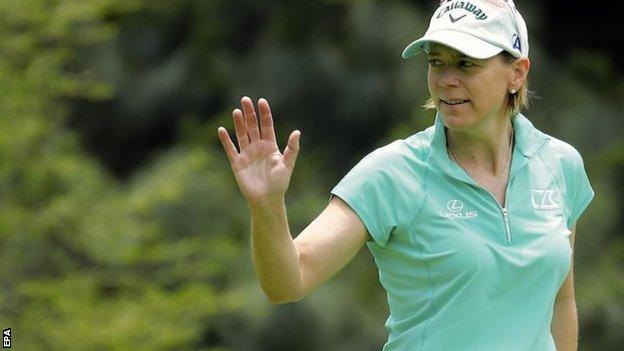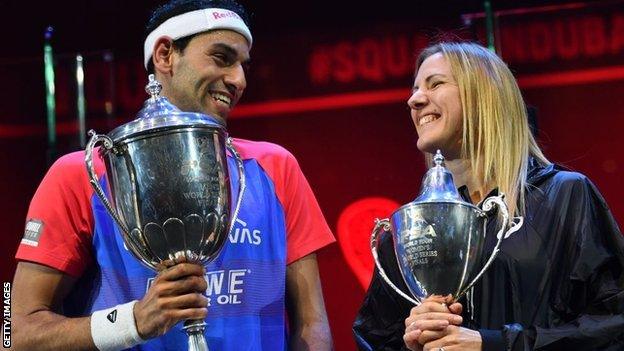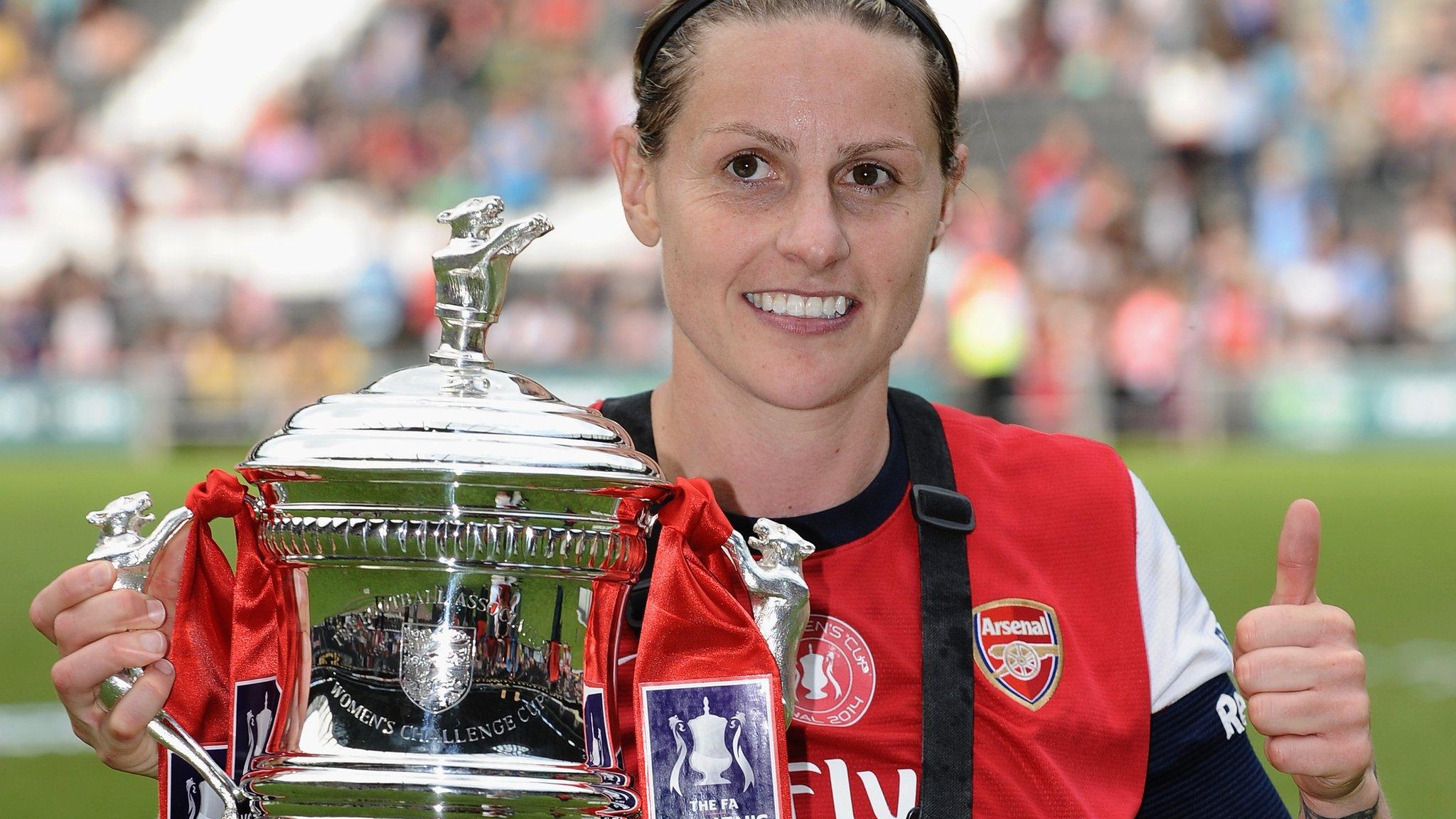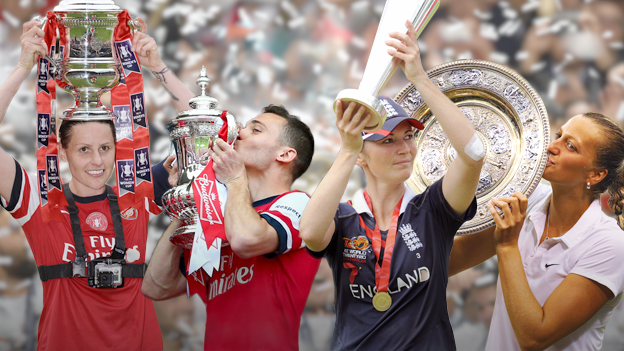Women's Sport Week 2017: Gender prize money gap narrowing, new study shows
- Published
Joanna Rowsell Shand: Why do women get paid less in prize money?
The gender prize money gap in sport is closing with more sports than ever achieving parity at the top level, a BBC Sport study has found.
A total of 83% of sports now reward men and women equally, according to the study commissioned for Women's Sport Week., external
Cricket, golf and football showed some of the biggest disparities although prize money for women has increased substantially in these sports over the past three years.
Other sports that do not reward male and female competitors equally according to the study are cliff diving, ski jumping and cycling events. Women are allowed to enter the world championships in darts and snooker but also have their own separate competitions, where prize money is a lot less.
Full table - prize money in sport
It is the second time BBC Sport has carried out the global study, for which 68 sports' governing bodies were contacted with 55 responding. The first one was in 2014. That study showed 30% of sports rewarded men better than women.
The 2017 study, which looked at prize money for world championships and events of an equivalent standard only, does not include wages, bonuses or sponsorship. It found that 44 sports pay prize money, of which 35 pay equally.
Men and women compete alongside each other in horse racing and equestrian events. Women do not compete in the winter sport called nordic combined, and men do not take part in synchronised swimming at the top level.
This week the ICC Women's World Cup begins in England and Wales and there will be a 10-fold increase in the prize money pot, up from £150,000 to £1.5m.
The victorious cricket team will receive £470,000 - up from the £47,000 winner's cheque Australia were given in 2013. There will also be £15,500 given per group-match win.
But the winning men's team at the 2019 World Cup will still be awarded six times as much prize money - £3.1m.
Sports Minister Tracey Crouch said: "It is encouraging that remuneration for sportswomen has improved and we are seeing greater equality in professional sport.
"However, there is still more work to be done to put women's sport on the same footing as men's.
"Women's Sport Week provides a fantastic opportunity to continue to raise the profile of women in sport, celebrate phenomenal female athletes and champion participation for women of all ages and backgrounds."
Clare Connor, chair of the ICC women's committee, said there was a commitment by the ICC to pay equal prize money by 2032.
"These things don't happen overnight. Sports are on their own individual journeys and as a team sport we're at an exciting time too," she told BBC Sport.
"There will be a strategic plan to ensure that the game can deliver equal prize money in 15 years."
Regarding the increased prize money for the upcoming Women's World Cup, she added: "The most important thing is, it gives recognition and a really strong message where the women's game is globally now - the appetite to watch it, broadcast it and for more and more players to aspire to play at the top level.
"It is a sport which is progressing quickly and with the frequency of ICC global events, there's a lot to play for, and reward and recognition for the players."

Sorenstam is confident female golfers will continue to work hard to close the gap in prize money
Female golfers are among the highest earners in elite sport but they receive less than half the prize money of their male counterparts at majors, although the gap is closing.
The Women's British Open, external in Scotland in August will hand over £487,500 to the winner - up from the £298,000 American Mo Martin was given at Royal Birkdale in 2014. The Southport course hosts the men's Open in July and whoever tops the leaderboard on 23 July will receive £1.175m.
Ivan Peter Khodabakhsh, chief executive of the Ladies European Tour, said he was still striving for parity in prize money.
"We are extremely proud of the significant strides which have been made in redressing the gender imbalance in prize money across the whole of sport over the last three years," he told BBC Sport.
"Knowing the reality in the market, however, I would question that 80% of sports have equal prize money. We believe there is still a significant gap between the treatment of men's and women's events. More needs to be done from a social perspective to improve the perception of women's sport and the financial rewards."
European Solheim Cup captain Annika Sorenstam said women's golf was "doing a good job" but that players would continue to "work hard" to address the disparity.
She added: "Sport is a mirror of the business world. Unfortunately a lot of women in the business world don't always get paid the same as a man in the same role. We just have to continue to fight for it and hope they pay by performance and not by gender."
She also stressed it was important to consider the impact of sponsorship, which can be higher in men's sport because it features more prominently on television.
Tennis was the first sport to pay equal prize money when the US Open started doing so in 1973 after campaigning from Billie Jean King and eight other female tennis players. By 2004 Athletics, bowls, skating, marathons, shooting, and volleyball all paid equal prize money.
Since 2004, a further 12 sports have starting doing so with squash, surfing and all World Championship cycling events achieving equality in the past three years.
Surfing pays out the same overall prize money to the men's and women's WSL Champions. Prize money for individual events in the league is based on the number of competitors involved, which means the men's events award more because more men are competing.
England's former world squash number one Laura Massaro has benefited from squash's decision to reward male and female players equally from this year and said sports women should be vocal in their fight for equality.
"It frustrated me that we played the same number of games and put in the same amount of training and effort as the men but because we may have been perceived as playing at a slightly lower level to the men we weren't paid the same," the 33-year-old told BBC Sport.
"To see that come good now after pushing for the women to be a part of the World Squash Association and growing the sport together as equals has been a real bonus."

Squash has introduced equal prize money for men and women
Massaro, who in March became the first English woman for 66 years to win a second British Open title, wants more women to speak out. "There's a responsibility for the top women in the world to really push the level of earnings up," she said. "You need to ask for the same money as the men and believe you're worth it."
Football remains one of the sports where, although the pay gap has closed, there are still big differences in the prizes for men and women.
There is currently no prize money in the Women's Super League, while the Premier League winners, Chelsea, received £38m this year.
Real Madrid's men pocketed £13.5m for their Champions League win over Juventus, while defending champions Lyon took home £219,920 after defeating Paris St-Germain in the Women's Champions League final.
- Published19 June 2017
- Attribution
- Published28 October 2014

- Published28 October 2014
